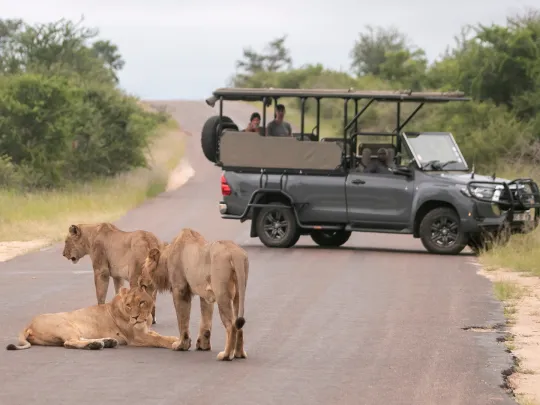Seasons of Kruger: When Is the Best Time to Visit Kruger National Park?
There's no bad time to go on safari in Kruger National Park. Each season offers something unique, from the vibrant green bushveld of summer to the clear skies and incredible game viewing of winter. Whether you're a birding enthusiast, wildlife photographer, or first-time visitor hoping to spot the Big Five, understanding Kruger's seasons can help you choose the perfect time for your trip.
Let's take a look at what to expect throughout the year — and why every month in Kruger has its magic.
Kruger in Summer (October to March)

Baby impalas from one of our December safaris
Lush Landscapes, Baby Animals & Birding Bonanza
Kruger's summer season coincides with South Africa's rainy season. Expect spectacular afternoon thunderstorms, lush green landscapes, and a buzz of new life. The rivers and waterholes brim with water, and the animals are well-fed and often seen with their young. Migratory birds arrive in full force, making this the best season for birdwatching in Kruger.
Highlights of summer:
- Excellent birding with migratory species in abundance
- Baby impalas, zebras, wildebeest and more (especially November–December)
- Dramatic afternoon thunderstorms and breathtaking sunsets
- Dense vegetation means fewer crowds at sightings
- Petrichor: the heavenly scent of rain on dry African soil
But summer also means heat — daytime temperatures can soar above 35°C. If you're visiting between October and March, be sure to book air-conditioned accommodation. Also note: this is malaria season. The risk is low but present, so consult your doctor about malaria prophylaxis.
December and January are peak travel months in South Africa, with long school holidays bringing many local visitors to Kruger. Camps and lodges fill up fast, so it's essential to book well in advance — especially if you're after prime locations or specific travel dates. Take advantage of our early bird specials to secure your preferred departure dates and save money on your Kruger safari.
Kruger in Winter (April to September)

Two male lions bathing in the late afternoon winter light
Prime Game Viewing & Sunny Skies
Winter is the dry season in Kruger, and arguably the best time for classic big game safaris. With the vegetation thinned out and animals gathering around shrinking water sources, wildlife is easier to spot — especially predators. The cooler temperatures also make for more comfortable game drives.
What to expect in winter:
- Exceptional game viewing as animals gather at waterholes
- Fewer mosquitoes and minimal risk of malaria
- Crisp, sunny days and cool nights
- Ideal photography conditions with clear light and golden grass
- Fewer leaves and lower grass = more visibility
Morning drives can be chilly — temperatures may dip below 10°C before sunrise — so don't forget warm layers, hats and gloves. July is another peak holiday period, and popular areas may be busier than usual. Chat to our team about the best routes and times if you prefer a quieter experience.
Which Season Is Best?
It depends on what you're after. Visit in summer for lush greenery, newborn wildlife, and birding magic. Come in winter for unparalleled game viewing, cooler weather and clear, dust-free skies. Or better yet — go twice and see both sides of Kruger's seasonal splendour.
Our Safari Expert Tip
Don't let the calendar decide for you. Our Africa Safari Specialists can help you find the best balance between your travel dates, budget, and what you most want to see. Whether it's baby impalas in summer or lion cubs at a winter waterhole, Kruger delivers unforgettable moments in every season.
Share Your Experience
Have you been to Kruger in summer or winter? Which season stole your heart? Share your experience in the comments — we'd love to hear your Kruger story.
You may also want to look at

7 Best Ways to Experience Kruger National Park
Kruger National Park is one of Africa's top safari destinations and should be on every wildlife lover's bucket list. Covering nearly two million hectares, Greater Kruger is home to an incredible diversity of wildlife, including the Big Five and over 500 bird species. But what's the best way to experience this iconic park?

Top 10 Things You Probably Didn't Know About Kruger National Park
Think you know Kruger? South Africa's iconic Kruger National Park is world-famous for Big 5 sightings and epic safaris—but there's more to this wilderness than meets the eye. Discover 10 surprising facts about Kruger that even seasoned safari-goers might not know, from its staggering size and biodiversity to its ancient history and vital conservation work.

Which Kruger Safari Is Right for You? Comparing Our 3-, 4- and 5-Day Safaris
If you're planning a once-in-a-lifetime safari to Kruger National Park, one of the first questions to answer is: How many days do I need?
About the author

Briony Chisholm has been travelling the back roads of South Africa for as long as she can remember – she’s from one of those families. The safari writing, however, only started a couple of years’ ago, and she loves it. She can even tell you the difference between safari vehicles now. Briony lives in Cape Town from where she does much armchair travelling and as much real travelling as she can fit in.









